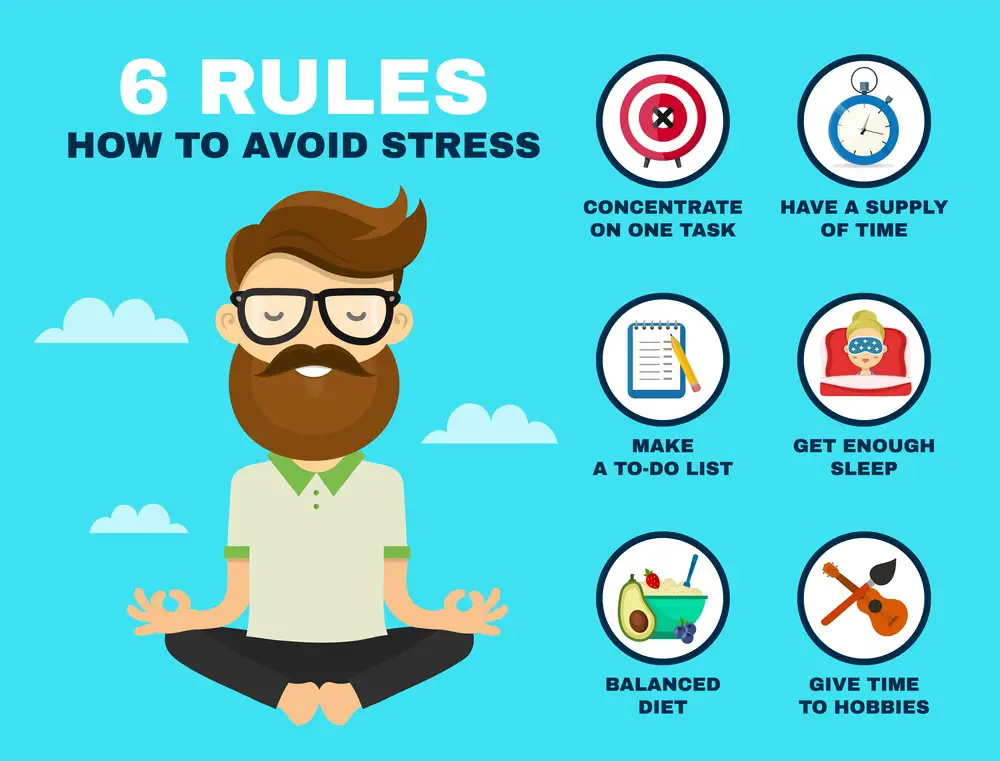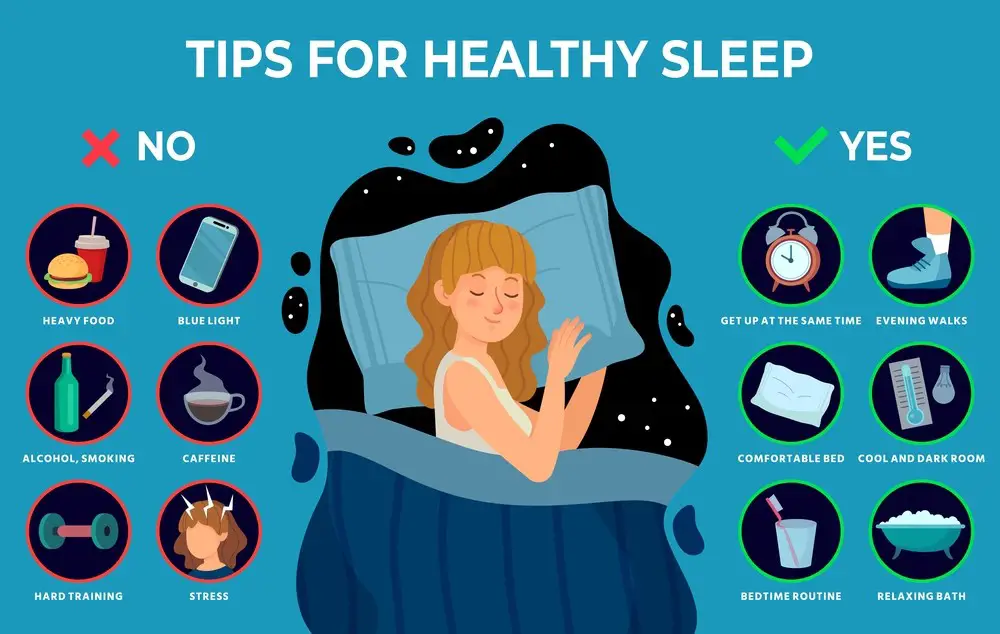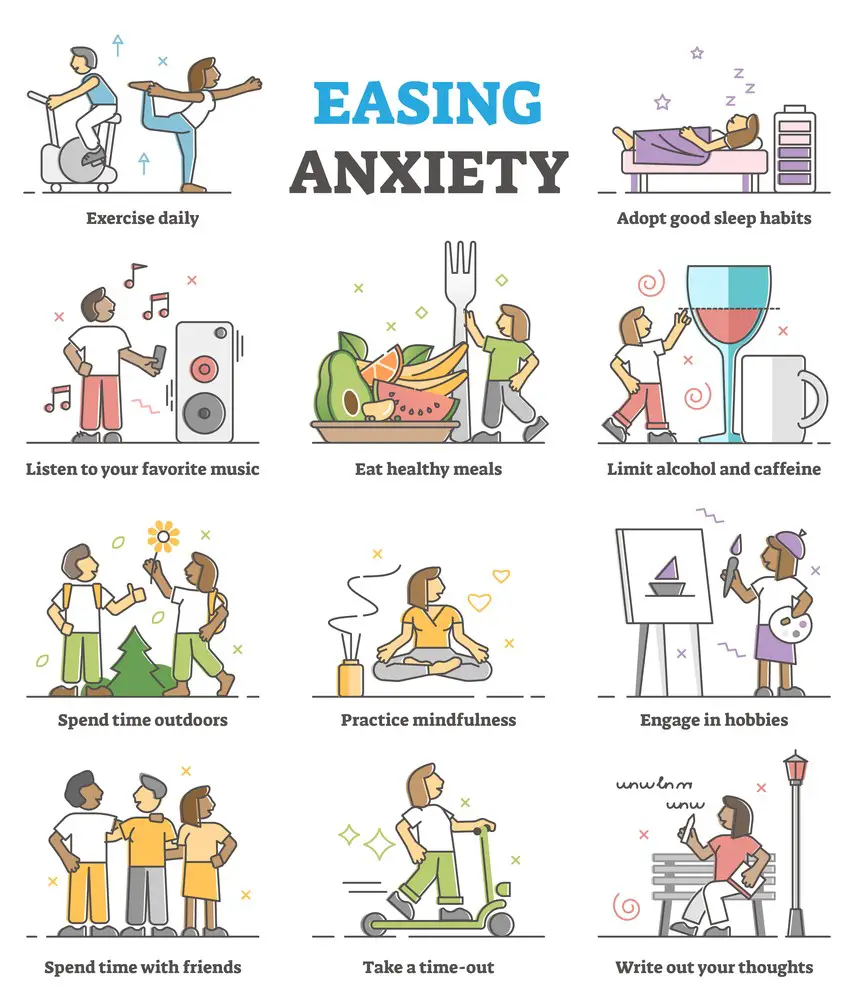As a BetterHelp affiliate, we receive compensation from BetterHelp if you purchase products or services through the links provided
Experiencing exhaustion is a challenge, but it may hold a surprising benefit regarding stress management. As we go through life, various stressors can take a toll on our mental health, pushing us to our limits and ultimately leading to exhaustion. During these periods, unique coping mechanisms may kick in, making stress surprisingly easier to handle.
When exhaustion sets in, it limits our emotional and cognitive capacities, forcing our minds to focus on essential tasks while ignoring non-critical stressors. This can lead to a heightened sense of prioritization and ultimately enable us to manage stress more effectively. However, it is essential to be mindful of your well-being while exploring this phenomenon, as prolonged exhaustion can have grim health consequences.
Key Takeaways
- Exhaustion can help streamline your focus, making some stressors easier to manage.
- Prolonged exhaustion may have severe health consequences.
- Remember to prioritize rest and seek professional support if needed.
 Understanding Exhaustion
Understanding Exhaustion
Physical and Mental Exhaustion
Exhaustion can manifest in two ways: physical and mental. Physical exhaustion results from a tired body after long periods of stress, work, or exercise. It can lead to feelings of fatigue, muscle aches, and even nausea. On the other hand, mental exhaustion occurs when your mind is constantly under pressure, leading to significant cognitive fatigue that negatively affects your thought processes due to prolonged stressors.
Both physical and mental exhaustion can impact different aspects of your life, such as your physical and mental health. When you experience any form of exhaustion, it’s essential to rest, recover, and focus on self-care.
Symptoms of Exhaustion
Exhaustion can manifest in various ways, including some of the common symptoms listed below:
- Fatigue
- Aches and pains
- Nausea
- Insomnia or disturbed sleep
- Loss of concentration
- Poor judgment
It’s essential to recognize the signs of exhaustion to manage your stress effectively and maintain a healthy balance. Remember that once exhaustion sets in, stress may not necessarily become easier to manage. It could exacerbate the situation if not addressed. A proactive approach to identifying and managing these symptoms will significantly benefit your well-being.
Remember: Stay aware of the signs of exhaustion and give yourself the proper care and rest you need to maintain a healthy balance.
 Health Impact of Chronic Stress
Health Impact of Chronic Stress
Physical Consequences
Chronic stress can wreak havoc on your physical health. Long-term exposure to stress affects your immune system, making you more susceptible to illness and infections. Cortisol, a hormone released during stress responses, can cause imbalances in your body’s functions, leading to tension, aches, and other physical discomforts. Remember to:
- Pay attention to bodily aches and pains
- Keep an eye on your immune system’s health
- Monitor hormonal imbalances
Mental Health Consequences
When it comes to mental health, chronic stress takes a toll. High stress levels can trigger anxiety and depression, making it hard for you to cope with daily challenges. Be mindful of:
- Signs of anxiety-like excessive worry or racing thoughts
- Indicators of depression, such as fatigue or feelings of hopelessness
- Other mental health symptoms that appear due to stress
Key takeaway: Watch for emotional signs of stress and seek help if needed.
Behavioral Changes
Chronic stress doesn’t just affect your physical and mental health; it can also cause noticeable behavioral changes. You may become more irritable, feel anger more efficiently, or rely on alcohol and substances to cope with stressors. To maintain a balanced lifestyle, try these tips:
- Avoid developing negative habits as coping mechanisms
- Focus on healthy ways to manage stress, like exercise or hobbies
- Reach out to friends and family for support when needed
Key takeaway: Recognize and address behavioral changes due to stress to maintain overall well-being.
 How Exhaustion Can Make Stress Management Easier
How Exhaustion Can Make Stress Management Easier
Increased Awareness and Recognition
When we experience exhaustion, it becomes easier to manage stress as we become more attuned to the signs and symptoms of our bodies. Instead of continuing to push through the distress, recognizing exhaustion allows you to identify stressors and triggers that contribute to burnout and mental exhaustion. By being more aware, you’ll be better equipped to devise strategies and techniques to address these issues, leading to a healthier mental state.
Here are a few tips to increase your awareness:
- Take note of your physical and emotional symptoms as they arise
- Regularly self-reflect on your well-being
- Consult with your support system and listen to their observations
Emotive Reactions and Sensitivities
Exhaustion can also help with stress management by revealing heightened emotions and sensitivities. When you’re feeling burnt out, you might experience more intense emotions and react to stressors more efficiently, increasing motivation for change. As you become more aware of your responses to stress, you can develop coping mechanisms to reduce emotional distress and counteract the negative effects of stress.
To handle your emotive reactions, here are some strategies:
- Practice mindfulness, meditation, and deep-breathing exercises
- Seek professional help when symptoms become overwhelming
- Schedule time for self-care and relaxation activities
Overall, recognizing and addressing exhaustion can lead to an increased sense of self-awareness and emotional understanding. By managing your stress, you’ll help prevent burnout, detachment, and cynicism, ultimately leading to a more balanced and fulfilling life.
 Rest and Recharge to Counteract Exhaustion
Rest and Recharge to Counteract Exhaustion
Importance of Breaks
Taking regular breaks is vital for maintaining your well-being and preventing burnout. When you allow yourself time to relax and step away from your daily tasks, your mind gets to rest, and your stress levels can decrease. Work-life balance is essential—a healthy balance ensures you can recharge physically, emotionally, and mentally. Remember, it’s crucial to prioritize rest and give your body and mind time to recuperate.
Practices to Encourage Sleep
Getting a good night’s sleep plays a significant role in helping you recharge. Here are some tips to improve your sleep quality:
- Establish a consistent sleep schedule
- Create a relaxing bedtime routine
- Ensure your bedroom environment is comfortable and conducive to sleep
- Limit exposure to screens before bedtime
- Consider incorporating relaxation techniques, such as deep breathing or meditation, into your nightly routine.
 Relaxation Techniques
Relaxation Techniques
Incorporating relaxation techniques into your daily routine can help reduce stress and improve your overall well-being. Here are a few methods to consider:
- Deep breathing exercises: Taking slow, deep breaths can help calm your mind and body. Try inhaling for four counts, holding your breath for four counts, and exhaling for four counts. Repeat this process several times.
- Meditation: There are various forms of meditation, from mindfulness to guided imagery. Find a style that resonates with you and practice regularly for the best results.
- Progressive muscle relaxation: This technique involves tensing and relaxing muscle groups throughout your body, which can help release tension and promote relaxation.
- Massage: Treat yourself to a massage, either professionally or using a foam roller or massage ball at home. This can help relieve muscle tension and assist in relaxation.
- Yoga: Practicing yoga can help you focus on your breath, release tension, and improve your overall mood. Find a yoga style that fits your needs and preferences.
By incorporating these practices into your daily routine, you can rest and recharge more effectively, making it easier to manage stress and prevent exhaustion.
Managing Stress in Various Settings
Stress affects everyone, but it can manifest differently in various settings. In this section, we’ll discuss some tips and strategies to help you manage stress at work and in your relationships.
Stress Management at Work
Stress at work can have a significant impact on your health and productivity. Try incorporating some of these strategies to alleviate stress and be more effective at your job:
- Prioritize: Create a to-do list and prioritize your tasks. Focus on what’s most essential and urgent and tackle them individually.
- Take breaks: Allow yourself short breaks throughout the day to stretch, walk, or breathe. It helps to clear your mind and recharge your energy.
- Set boundaries: Learn to say no to additional tasks when overwhelmed with responsibilities.
- Delegate: Don’t hesitate to delegate tasks or ask for help.
- Stay organized: Establish a system to keep your workspace and digital files clutter-free.
Key takeaway: Managing stress at work involves prioritization, organization, and setting boundaries to maintain a healthy work-life balance.
Managing Stress in Relationships
Relationships can be a source of support but also a cause of stress. Here are some tips to help you manage stress in your relationships:
- Communicate openly: Express your feelings, needs, and concerns with your partner or friends. Open communication helps in resolving issues and preventing misunderstandings.
- Listen actively: Give your full attention when the other person talks, and show empathy while listening to their issues.
- Be flexible: Learn to compromise and adapt to changes in your relationships. It’s essential to accept that nothing is perfect and you can’t control everything.
- Set boundaries: Clearly define your expectations, limits, and what you’re unwilling to accept in a relationship. Set healthy boundaries to protect your well-being.
- Celebrate successes: Acknowledge achievements and joyous moments in your relationships to create a supportive environment.
Key takeaway: Managing stress in relationships involves open communication, active listening, flexibility, and setting boundaries to create a healthy and supportive partnership.

Professional Support and Stress Management
Managing stress and exhaustion is a challenge that often requires a combination of self-care and professional support. In this section, we’ll explore ways professionals can help you manage stress more effectively and overcome exhaustion. Remember to prioritize your physical and mental health, and never hesitate to seek help.
Seeking Mental Health Support
Sometimes, talking to a mental health professional, such as a counselor or therapist, can make a huge difference in coping with stress and exhaustion. Mental health experts can help you understand the underlying causes of your stress, as well as provide guidance on improving your overall mental well-being.
There are various strategies that mental health professionals can teach you to manage stress, including:
- Cognitive-behavioral therapy (CBT): This approach helps you identify and change negative thought patterns, as well as develop healthier coping skills.
- Stress reduction techniques: Deep breathing exercises, progressive muscle relaxation, and mindfulness meditation are some examples that can help you relax and cope with stress more effectively.
- Setting boundaries: Learning to say no and establishing healthy boundaries in work and personal life can help you regain control of your time and energy.
Medical Intervention for Stress and Exhaustion
When stress and exhaustion reach a point where they’re significantly impacting your daily life, it might be time to consult a medical professional. Physical and mental health are interconnected, and treating any underlying conditions can help improve your ability to manage stress.
Here are some reasons why you might seek medical intervention for stress and exhaustion:
- Persistent physical symptoms: Body aches, headaches, and gastrointestinal issues may be related to stress and require attention from a healthcare professional.
- Difficulty sleeping: Insomnia or other sleep disruptions can exacerbate stress and exhaustion.
- Depression or anxiety: These mental health concerns may be contributing factors to your stress and may require additional treatment.
Medical professionals can assess your situation and determine if medication, lifestyle changes, or other interventions are necessary to help you manage stress and overcome exhaustion. Remember, you don’t have to face stress and exhaustion alone—professional support can be crucial in helping you restore your well-being and improve your quality of life.
Harnessing a Positive Outlook Towards Stress and Exhaustion
While experiencing stress and exhaustion isn’t a delightful encounter, cultivating a positive perspective can significantly influence how we manage these challenges. Here’s how you can harness a positive outlook to manage stress and exhaustion better:
- Reframe Stressful Thoughts:
- Catch negative thoughts and reframe them into positive or neutral ones. For instance, change “I can’t handle this” to “Let’s break this down into steps I can manage.”
- Practice Gratitude:
- Amidst the hustle, take a moment each day to reflect on what you’re grateful for. It could be anything from a supportive family, a comfortable home, or even small wins at work.
- Embrace the Learning:
- Every challenge comes with a learning opportunity. Embrace the learning that comes from dealing with stress and exhaustion. It might be discovering new coping mechanisms, understanding your limits, or even learning what not to do in the future.
- Celebrate Small Wins:
- Celebrate your achievements, no matter how small. It can boost your morale and motivate you to continue healthily working through stress.
- Engage in Positive Affirmations:
- Start your day with positive affirmations to cultivate a positive mindset that can help buffer the adverse effects of stress.
- Maintain a Sense of Humor:
- Laughter can be a great stress reliever. Share a joke with a colleague, watch a funny video, or learn to laugh at the small mistakes instead of brooding over them.
- Connect with Positive Individuals:
- Surround yourself with positive, supportive individuals who uplift you. Their positive energy can be quite contagious!
- Seek Inspiration:
- Read inspirational books, listen to motivational podcasts, or watch uplifting videos that provide a fresh, positive perspective towards handling stress and exhaustion.
- Practice Mindfulness and Relaxation Techniques:
- Engage in meditation, yoga, and breathing exercises to stay grounded and maintain a positive outlook.
Key Takeaway: Cultivating a positive outlook is a proactive approach to managing stress and exhaustion. By practicing gratitude, embracing learning, celebrating small wins, and engaging in positive affirmations, you can navigate stress and exhaustion with a more balanced and optimistic perspective.
 Signs That Therapy May Be Needed
Signs That Therapy May Be Needed
Therapy is a valuable resource for exploring personal challenges, understanding emotional responses, and developing coping strategies. However, recognizing when to seek therapy can sometimes be a challenge. Here are some signs that therapy may be beneficial for managing stress and exhaustion:
- Persistent Feelings of Overwhelm:
- If you find yourself constantly overwhelmed or unable to cope with the stresses in your life, it might be time to seek professional help.
- Interference with Daily Life:
- When stress or exhaustion starts interfering with your ability to perform daily tasks, maintain relationships, or fulfill work responsibilities, therapy could provide the support needed to work through these challenges.
- Unmanageable Anxiety or Depression:
- If anxiety or depression is hindering your quality of life, a therapist can help explore underlying issues and develop coping strategies.
- Negative Behavioral Changes:
- Noticeable changes in behavior, like withdrawal from social activities, irritability, or reliance on substances to cope, are signs that therapy may be beneficial.
- Chronic Physical Symptoms:
- If you’re experiencing persistent physical symptoms like headaches, muscle tension, or gastrointestinal issues linked to stress, it’s wise to consider therapy.
- Sleep Disturbances:
- Struggling with falling asleep, staying asleep, or experiencing nightmares may signal a need for professional support.
- Feelings of Hopelessness or Desperation:
- If you often feel hopeless, desperate, or overwhelmed by negative thoughts, therapy can provide a supportive environment to work through these feelings.
- Trouble Concentrating or Making Decisions:
- Difficulty with concentration or decision-making can be signs of underlying anxiety or depression, and therapy can help address these challenges.
- Experiencing Trauma:
- If you’ve recently gone through a traumatic event and are finding it difficult to cope, therapy can provide a safe space to process your experiences.
- Relationship Struggles:
- If stress is causing strain in your relationships, therapy can help explore communication strategies and resolve conflicts.
Key Takeaway: It’s essential to tune into your emotional and physical signals as they can indicate when professional support is necessary. Therapy can provide a supportive environment to explore challenges, develop coping strategies, and work towards improved mental well-being. If you resonate with any of the signs mentioned above, it might be a good time to consider seeking therapy.
Frequently Asked Questions

What happens during the exhaustion stage of stress?
During the exhaustion stage of stress, your body’s ability to cope with stressors decreases due to prolonged exposure to stress. This stage can hurt your physical and mental health. Sometimes, it can lead to burnout or other health problems if left unchecked. To prevent reaching this stage, it’s essential to find effective ways to manage stress and allow your body and mind to recover.
What are the key signs of mental health stress?
The key signs of mental health stress may include:
- Difficulty concentrating
- Irritability
- Anxiety
- Mood swings
- Sleep disturbances
- Overwhelm
- Fatigue
Being aware of these signs is crucial; they can help you identify when you need to find ways to cope and reduce your stress levels effectively.
What are some ways to cope with stress?
Some ways to help you cope with stress include:
- Practicing mindfulness or meditation
- Engaging in physical activity, like going for a walk or doing yoga
- Connecting with friends and family for support
- Listening to calming music
- Setting realistic goals and prioritizing tasks
- Creating a relaxing environment and practicing good sleep hygiene
Remember, finding the right coping strategies for you may take some trial and error, but the most important thing is to find something that works for you.
What are the three stages of general adaptation syndrome?
The three stages of general adaptation syndrome are:
- Alarm: Your body recognizes a stressor and activates the “fight or flight” response.
- Resistance: Your body tries to resist the stressor and return to a state of equilibrium.
- Exhaustion: If the stressor continues, your body’s ability to resist becomes depleted, which can lead to burnout or other health issues.
Understanding these stages can help you recognize when you are experiencing prolonged stress and take the necessary steps to manage and cope with it effectively.
How does burnout occur in relation to stress?
Burnout occurs when you are continuously exposed to high levels of stress without adequate periods of recovery. This constant stress can deplete your mental and physical resources, leading to symptoms such as exhaustion, cynicism, reduced productivity, and a feeling of disconnection from your work or personal life. To prevent burnout, it’s essential to find ways to effectively manage stress and ensure you have periods of recovery and relaxation.
Which symptoms are considered physical effects of stress?
Some physical symptoms of stress may include:
- Headaches
- Muscle tension or pain
- Digestive problems
- Sleep disturbances
- Chest pain or heart palpitations
If you experience these symptoms as a result of stress, it’s crucial to find ways to address the stressors and practice self-care to maintain your overall well-being.
About Jacob Maslow
After surviving the traumatizing events of 9/11, I took it upon myself to heal through helping others. I’m the primary caregiver of my children and understand from first-hand experience the lonely paths you have to walk as a partner and parent when leaving an unhealthy relationship.
We’re all echoing in a dark space that doesn’t have to be this empty, and that’s been my mission since finding solace and recovery in therapy: To help comfort others who are still in shock and at the prime of their struggle.
I came across BetterHelp after searching for this type of community. I wanted to belong to a body of proactive therapists and supportive therapy veterans that allowed me to see other sides of the story.
It was unconventional, and that’s what attracted me most. During my most challenging times, when my ex-wife completely cut me off from my children, I found comfort and clarity through BetterHelp.
Instead of being chained to a strict therapist recommendation, I was in charge of who I felt understood my struggle most. That allowed me to find my true peace, as I was reunited with those who read behind my words and had first-hand experience with my trauma.
Recovery is a choice; with BetterHelp, that choice will be a few clicks away. You can join their couples-oriented platform, Regain.us, for those stuck with family estrangement and toxic relationship patterns.
- Breaking the Silence: Why Men’s Mental Health Matters More Than Ever - April 15, 2025
- How to Transform a Home’s Patio Space into a Relaxing Space - March 23, 2025
- 5 Strategies to Use a Cell Phone to Help Manage Your Stress - March 23, 2025
This site contains affiliate links to products. We will receive a commission for purchases made through these links.


 Understanding Exhaustion
Understanding Exhaustion Health Impact of Chronic Stress
Health Impact of Chronic Stress How Exhaustion Can Make Stress Management Easier
How Exhaustion Can Make Stress Management Easier Rest and Recharge to Counteract Exhaustion
Rest and Recharge to Counteract Exhaustion Relaxation Techniques
Relaxation Techniques Signs That Therapy May Be Needed
Signs That Therapy May Be Needed
